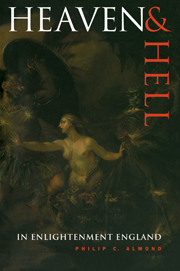1 - The journey of the soul
Published online by Cambridge University Press: 18 December 2009
Summary
THE PRE-EXISTENCE OF THE SOUL
I loved not to see, what I reputed a fable and Imposture travel so confidently through the World, and everywhere vaunt itself for a genuine truth.
The fable and imposture to which Edward Warren was referring in 1667 was the concept of the pre-existence of the soul in an aethereal or aerial realm prior to its embodiment in a terrestrial body. Warren was exaggerating the universality of the adoption of this concept. Certainly, in England, it remained the preserve of the intellectual elite, and in so far as it was expounded and defended, it was done with caution and some little reticence. Nevertheless, asserted and defended it was, and by several of the Restoration period's leading Platonists — the Cambridge Platonist Henry More, the Oxford Anglican cleric Joseph Glanvill, and the Anglican Bishop George Rust.
The unorthodoxy of the concept of the pre-existence of the soul was recognised by proponents and opponents alike. But by the former, it was presented as a rational opinion with scriptural assent which could be maintained without danger to the essentials of the faith. In the Preface to his Lux Orientalis, for example, Joseph Glanvill maintained that the Anglican Church gave latitude for speculation on matters not necessary or fundamental to the Faith, that the doctrine of pre-existence had never been excluded by the Anglican or any other church, and that he intended no innovation or disturbance to it.
- Type
- Chapter
- Information
- Heaven and Hell in Enlightenment England , pp. 4 - 37Publisher: Cambridge University PressPrint publication year: 1994



